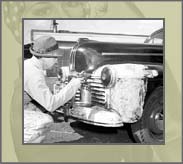|
Changes

This
man is preparing his car for driving during a blackout by painting
his headlights black. Photo Credit: Corbis Images |
Things changed
after the war began. We had to do many things to secure the safety
of our country, especially since we were on the East coast. The
East and West coasts were especially scared of air raids. It was
thought that the coastline would be the first target for enemy planes
coming over from Europe or the Pacific. We turned off all lights
when the air raid sirens went off. We painted car headlights halfway
down with black paint to keep the light from reflecting into the
sky so that they could not be seen by enemy aircraft. The lights
on the boardwalks at the Jersey Shore were painted black on the
ocean side so that enemy ships could not see the shore.
My uncle became
a plane watcher as part of the Civil
Defense. He would go to a tower on the Staten Island shore with
his binoculars and look for enemy planes. He taught me how to listen
for planes without seeing them — something I still do till
this day.
Things changed
at my school as well. We could no longer study German, which I would
have liked, since my heritage is German. And now we had to take
two war courses — Morse
code and meteorology.
I particularly liked meteorology and could have been the first weather
woman if I had stuck with it.
Another change
was that gasoline was rationed to two gallons a week. Some jobs
like priests, ministers, and doctors had a higher allocation of
gas because it was important to their work. But the rest of us had
to be careful about how much driving we did.
Think About
It
Why do you think Morse code and meteorology were considered important
for the war effort?

|

